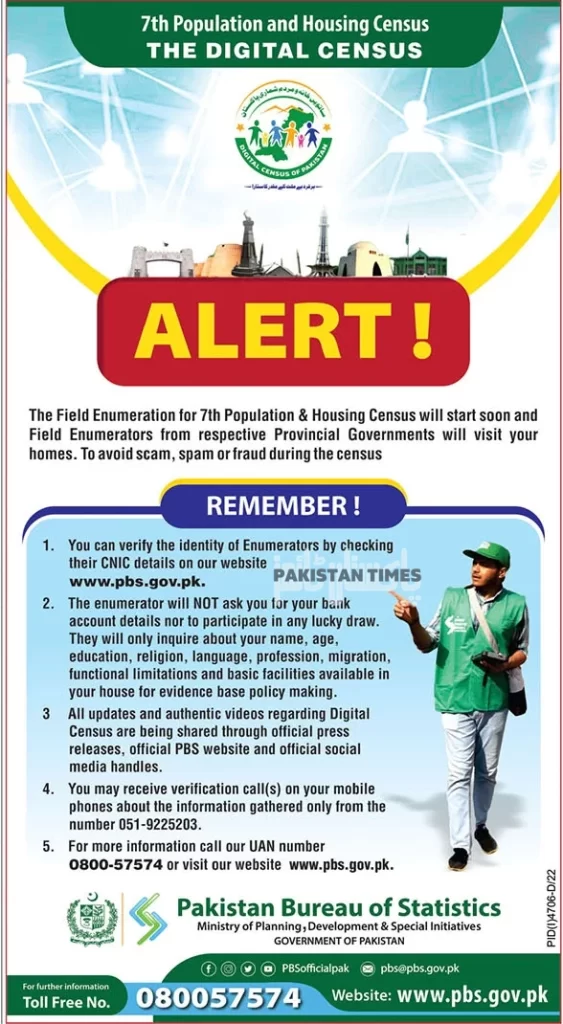Pakistan Census 2023 | Digital Census of Pakistan Schedule, Population and Housing Census
The 2023 Census of Pakistan will be a detailed enumeration of the Pakistani population that will be the seventh national census in the country. It is currently scheduled to be held from 1 March 2023 to April 2023 and will be conducted by the Pakistan Bureau of Statistics. This is Pakistan’s first digital census where 98 percent of the process will be conducted digitally, and geo-fencing and GIS mapping will be used to monitor the operation.

Updates / Important Highlights
- February 23, 2022: The National Census Coordination Center (N3C) was inaugurated in preparation for the census. It will monitor live census data and information.
- July 20, 2022: Pilot phase of census begins as information technology deployed across 429 census blocks.
- August 3, 2022: Pilot phase of census ends successfully.
- Field work start from February 1, 2023 to March 4, 2023.
2023 Census of Pakistan – Design
The 2023 Census of Pakistan will involve two questionnaires: a housing questionnaire and an individual questionnaire. Each question in both forms was deliberated on and improved by a twelve-member Questionnaire committee, headed by Demographer Dr. G. M. Arif. On July 15, 2021, the committee held a meeting where they finalized both questionnaires unanimously after a comprehensive study.
On the individual form, the religion question saw an expansion. The number of religious identifications Pakistanis could go by in the 2017 census was six (Muslim, Christian, Hindu, Ahmadiyya, Scheduled Castes, and Other), but this has increased to eight as of 2023 with the addition of the Sikh and Parsi categories. This change came after significant campaigning by Pakistani Sikhs for recognition as a religion in 2017. The change also had been mandated by a Pakistani chief justice ruling in October 2018 that in the next census, a separate category for Sikhs would be provided under the religion question.
The question asking for respondents’ mother tongue also saw its number of categories increase. Whereas in 2017, only ten categories were listed (Urdu, Punjabi, Sindhi, Pashto, Balochi, Kashmiri, Saraiki, Hindko, Brahui, and Other), the form for the 2023 census has sixteen choices. Shina, Balti, Mewati, Kalasha, Kohistani, and Pothwari are all recognized in the 2023 form as valid options to select in the language question.
The nationality question also saw an improvement, going from a binary option asking respondents whether they were Pakistani or not, to giving respondents more options. The 2023 form includes five choices Pakistani, Afghan, Bangladeshi, Chinese, and Other.
From December 2022 to January 2023, trainers and enumerators prepared for the census. On December 6, 2022, the training of master trainers began with an inauguration ceremony. By December 19, 2,875 trainers at the divisional level began their training and preparation across the country. Finally, on January 7, a group of 121,000 field staff at the tehsil level are expected to begin their training.
Why is 2023 Census in Pakistan important?
The census is a crucial tool for gathering information about a country’s population and its characteristics. This information is important for a variety of reasons. Firstly, it provides an accurate estimate of the population in Pakistan, which is essential for planning and allocation of resources. This is because population growth and change have an impact on various aspects of society, including the economy, education, health, and infrastructure.
Secondly, the census in Pakistan collects demographic information such as age, gender, education, occupation, and migration patterns, which can be used to understand the composition and characteristics of the population. This information is crucial for social and economic planning, as well as for designing policies that address the needs of different groups.
Thirdly, the Pakistan census helps determine the distribution of political power and representation by determining the number of seats each region will have in the National Assembly. This ensures that all regions have fair representation and equal opportunities.
Finally, the census provides valuable information for research and analysis, such as identifying trends in population growth, migration patterns, and other demographic changes. This information is crucial for making informed decisions and for understanding the challenges and opportunities facing the country.
Here are most important points:
- Population estimation: The census provides an accurate estimate of the country’s population, which is important for planning and allocation of resources.
- Demographic information: The census collects demographic information such as age, gender, education, occupation, and migration patterns.
- Resource allocation: The data collected in the census is used to allocate resources, such as health and education services, based on the needs and characteristics of the population.
- Planning for development: The census provides valuable information for planning and implementing development projects, such as infrastructure and housing.
- Representation: The census determines the number of seats each province will have in the National Assembly, ensuring fair representation for all regions.
- Poverty reduction: The census data can help identify areas of poverty, allowing the government to target specific areas for poverty reduction programs.
- Social planning: The census data can be used to plan social welfare programs and services, such as healthcare and education.
- Ethnic and linguistic diversity: The census provides information on ethnic and linguistic diversity, allowing the government to take measures to promote unity and integration.
- Economic planning: The census provides data on employment and economic activity, which is used to plan economic development and growth.
- Housing: The census provides information on housing, allowing the government to plan for the provision of adequate housing for all citizens.
- Health: The census provides data on health, including the prevalence of certain diseases, which can be used to plan for health services and programs.
- Disaster management: The census provides information on the population and their locations, which is important for planning and responding to natural disasters and emergencies.
In conclusion, the census is an essential tool for gathering important information about a country’s population and its characteristics, which is important for planning, resource allocation, representation, and research.
Alert for Information Verification
During the 7th Population and housing census, enumerators will go door to door for information verification. The Pakistan Bureau of Statistics (PBS) wants everyone to due diligence checking to verify the identity of Enumerators by checking their CNIC details on www.pbs.gov.pk.
Also note that the enumerators will only inquire about relevant details that include your name, age, education, religion, language, profession, migration, functional limitations and basic facilities available in your house for evidence base policy making.





